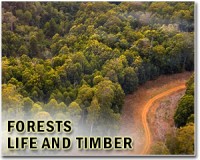 |
Cancun, Mexico (SPX) Dec 10, 2010 An exclusive focus on forests-as opposed to the entire landscape-could lead to inequitable and destructive outcomes for the poor in developing countries, said a Nairobi-based agroforestry research organization. Most deforestation and forest degradation is driven by forces outside forests, so capturing emissions and managing carbon stocks from land uses that involve the whole landscape, not just forests, must be included for the successful implementation of REDD+, according to World Agroforestry Centre (ICRAF). A recently published ICRAF policy brief noted that the emissions from changes in land use in Indonesia, which is the highest in the developing world, are as high outside as inside what is defined as a forest area. Yet, most REDD+ discussions so far have bypassed the trees on farms and the changes in agroforests. "Issues of carbon leakage and emission displacement will haunt REDD's effectiveness until it is more inclusive and comprehensive," said Dr. Meine van Noordwijk, the Chief Science Advisor at the World Agroforestry Centre. A whole landscape approach could save REDD+. What is included or not included in REDD+ as currently framed is still subject to much debate. Yet trees on agricultural landscapes represent a globally important carbon stock. Forty-six percent of agricultural land globally has at least 10% tree cover. In Southeast Asia and Central America, 50% has at least 30% tree cover. The carbon stocks in peat lands are equivalent to 70 years worth of current global carbon dioxide emissions. The current REDD+ scope does not include peat lands that constitute already lost forest cover but keep emitting carbon dioxide. This is 3-5% of global CO2 emissions. "Ignoring this issue will undermine the success of global mechanisms for emission control," says Dr. Henry Neufeldt, Leader of the Global Research Programme on Climate Change at ICRAF. The Intergovernmental Panel on Climate Change (IPCC) accounting rules for Agriculture, Forestry and Other Land Use (AFOLU) provides a simple alternative: include all land use proportionate to actual emissions and emission potential. A whole-landscape approach can help address the drivers of deforestation, reduce problems like leakage, and eliminate the need for precise forest definitions. According to Dr. Peter Minang, The Global Coordinator of the ASB Partnership for Tropical Forest Margins, there are strategies that can be adopted by developing countries. "We are compiling evidence that shows how developing countries can adopt strategies for these high-carbon storing land-uses to reduce global emissions and benefit local people," says Dr. Minang. According to Dr. van Noordwijk:"Four 'pillars' that support a whole landscape agenda must be considered." He lists the four pillars as "Reducing forest-based emissions, Reducing emissions from peat, Restocking land through trees and soil carbon, and Reducing emissions from agricultural greenhouse gases." "What is needed now is a global commitment to move forward, comprehensively, to reduce emissions from all land uses," adds Dr. Neufeldt. Emissions embodied in trade may well be the hottest issues in trying to reduce emissions from land use: much of the emissions due to change in forest is linked to export and the responsibility for these emissions will have to be shared by the importing as well as exporting countries, for a fair and efficient accounting system. Before REDD projects are able to cut carbon emissions and benefit livelihoods, many developing countries will require substantial investments in capacity building, science and institutions. For example, countries will need technical support to develop carbon inventory systems and their remote sensing capacity. In addition, they will need support to set up the institutional infrastructure required to distribute REDD benefits and implement the various incentive schemes. Land tenure and forest governance are key factors determining the success or failure of REDD initiatives. The pressing need is for deforestation policies that reduce the rate of logging, enforce policies on the replacement planting of felled trees, and recognize and scale up agroforestry options as an important win-win solution to climate change - through mitigation and adaptation - as they improve the environment and generate income for poor people.
Share This Article With Planet Earth
Related Links World Agroforestry Centre Forestry News - Global and Local News, Science and Application
 Australia boosts support for Indonesian forest scheme
Australia boosts support for Indonesian forest schemeNusa Dua, Indonesia (AFP) Dec 9, 2010 Australia on Thursday doubled its funding for Indonesia's efforts to slash its greenhouse gas emissions from deforestation, and praised the country's "strong leadership" on climate change. Foreign Minister Kevin Rudd announced an additional 45 million dollars (44 million US dollars) in funding for cooperation on reducing emissions from deforestation (REDD) and climate change adaptation. ... read more |
|
| The content herein, unless otherwise known to be public domain, are Copyright 1995-2010 - SpaceDaily. AFP and UPI Wire Stories are copyright Agence France-Presse and United Press International. ESA Portal Reports are copyright European Space Agency. All NASA sourced material is public domain. Additional copyrights may apply in whole or part to other bona fide parties. Advertising does not imply endorsement,agreement or approval of any opinions, statements or information provided by SpaceDaily on any Web page published or hosted by SpaceDaily. Privacy Statement |